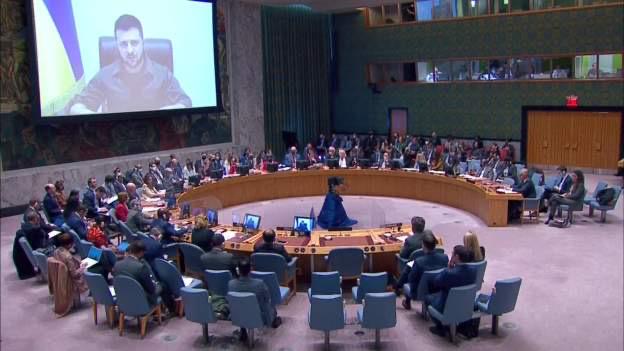Zelensky tells the United Nations Security Council he is addressing them on behalf of victims of Russia.
Speaking to the council for the first time since Russia invaded Ukraine, he says Russian troops have killed civilians and raped women.
Zelensky’s comments follow his visit to the town of Bucha on Monday, where the bodies of dead Ukrainian civilians were seen.
He accused Russia of committing genocide. Ukrainian President Volodymr Zelensky continues to list the atrocities he says Russian forces have committed during the invasion.
Speaking to the UN Security Council via translators, he says in the city of Bucha “there is not a single crime they would not commit”.
He claims people were shot in the street, in their homes, thrown into wells and crushed by tanks in the middle of the road “just for the pleasure” of the Russian soldiers.
He repeats his claim that the actions of the Russians is much like that of the terrorist group, Islamic State, and that President Putin’s propaganda seeks to “export” his own hatred into other countries beyond Ukraine.
Where is the security that the security council needs to deliver, he asks.
“Where is the peace? Where are those guarantees that the UN needs to guarantee?”
He says the world is yet to see what further war crimes the Russian military may have committed in other parts of Ukraine, further to the alleged killings in Bucha.
“Geography may be different or various, but cruelty is the same, crimes are the same, and accountability must be inevitable,” he says. President Zelensky goes on to demand that Russia faces “accountability”, saying it should be brought before an international tribunal similar to that held at the Nuremberg trials after World War Two.
The “massacre” in Bucha is only one example of many of what Russia has been doing in past 41 days, Zelensky says.
The world is yet to learn the full truth, he adds, with Russia’s military openly looting villages they have captured.
Zelensky also questions Russia’s role within the UN, saying the invasion “undermines” the whole architecture of global security.
BBC


